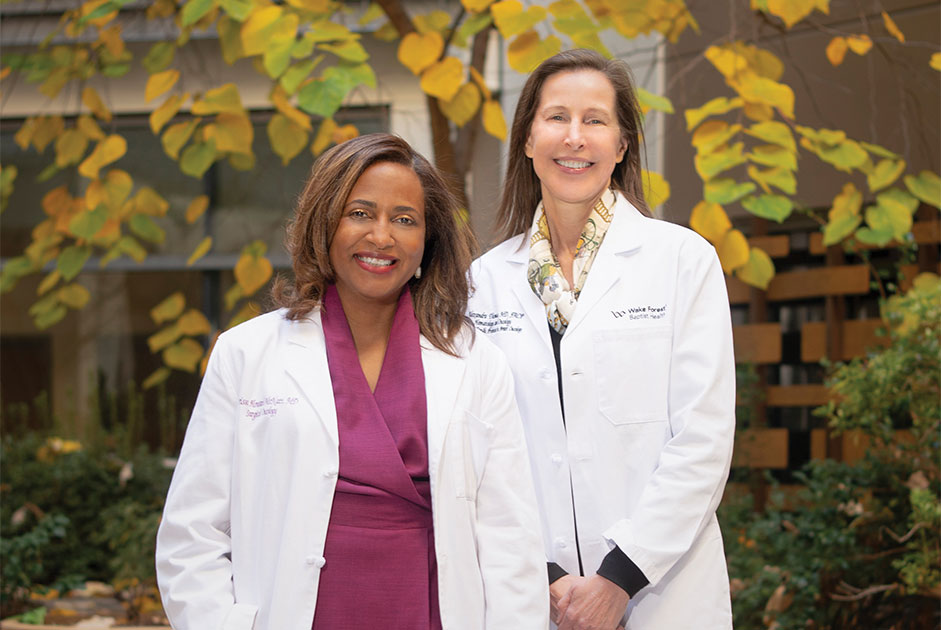Focus on Patient’s Perspective Creates More Personalized, Accessible Approach
Great strides have been made in the research, detection and treatment of breast cancer. In fact, rates of death from breast cancer decreased by 1% between 2013 and 2018 alone, thanks in part to screening and advances in treatment. The Comprehensive Cancer Center at Atrium Health Wake Forest Baptist is contributing to those advances with a multidisciplinary approach to care that is designed around the patient.

An Innovative Model
A cancer diagnosis is scary. Patients often feel overwhelmed and paralyzed. Understanding and accounting for the patient’s perspective on their cancer journey is at the heart of the Comprehensive Cancer Center and its enhanced approach to patient-centered care.
Dr. Alexandra Thomas, the Williams Family Professor in Breast Oncology and professor of hematology and oncology, explains the Breast Care Center was developed to focus on what the patient wants and needs after they’ve been told they have breast cancer. “We tried to make sure that we were looking through that lens during the process,” she says. “We care about our patients and feel strongly that the best care extends beyond our medical expertise, to patients’ emotional and psychological well-being, which complements our commitment to bringing them the best care.”
The highly personalized care starts before the patient’s first visit. After a woman receives her initial diagnosis, the care team moves quickly to develop a plan, reviewing all the patient’s medical records, as well as completing any financial clearances in advance. Then nurse navigators coordinate the patient’s first visit.
A true differentiator for patients comes during that initial visit. There’s no going to the medical oncologist one day, the surgical oncologist another and a plastic surgeon a week later. All those initial visits are consolidated into one — the patient visits the Comprehensive Cancer Center where they will see each provider who will be part of their care team on the same day.
Dr. Marissa Howard-McNatt, director of the Breast Care Center and professor of surgery, describes the approach as very special, but there’s a strong practical side to it as well. “Numerous clinical trials have shown patients who receive care from multidisciplinary centers have better outcomes,” she says. “All the doctors are talking together to make the best plan for each individual patient. I know what the oncologists want to do, and we discuss that together and with the patient.” Because the doctors are working together and seeing the patient in one visit, the team is able to get the care plan underway quickly.

Unique for North Carolina and Beyond
As one of only 51 Comprehensive Cancer Centers in the U.S., a designation granted by the National Cancer Institute (NCI), the Comprehensive Cancer Center has more than 400 cancer research and clinical specialists dedicated to cancer care, research, prevention and control.
To achieve this designation, the Comprehensive Cancer Center has to meet rigorous standards set by the National Cancer Institute to ensure it offers the world-class care required for the prestigious designation. Not only is Winston-Salem fortunate to have this quality of care locally, but the entire region benefits from this collaborative and innovative model of care.
Another strong aspect of the Breast Care Center program, shares Dr. Howard-McNatt, is that it is largely female-driven, with most of the providers made up of women, across all the disciplines. “That’s very unique to our program, not only in our region but in the state,” she says. In addition to Drs. Howard-McNatt and Thomas who run the program, there are four dedicated medical oncologists, three surgeons, two radiation oncologists and a team of specialists including reconstructive surgeons, genetic counselors and nurse navigators, who combined offer multiple layers of support.
Central to the patient-centered approach are the nurse navigators. They serve as the primary point of contact for patients throughout their diagnosis, treatment and recovery. One of those navigators, Liz Outlaw, says, “When patients first enter this world, they don’t know what they don’t know, and the nurse navigator is there to help them through the process.” Outlaw says the nurse navigators recognize patients are coming to the Comprehensive Cancer Center in a time of need, and they try to be proactive in the patient’s care, addressing things before they become issues.
“In talking with patients, I’ve had countless women tell me how they appreciated our multidisciplinary approach,” Outlaw shares. When patients leave their first appointment, she explains they’ve met all the key care providers. The physicians come to them, and, at the end of the visit, the nurse navigator gives them a documented summary with all their doctors’ names, a summary of the next steps and a schedule for scans and follow-up appointments.
Outlaw adds, “Patients have told us they appreciate our approach, and they feel reassured by the way everyone is working together. That’s key to our process — working together for their best possible outcome.”
Every year, there are still more than 6,000 women in North Carolina who will receive a breast cancer diagnosis. This year alone, more than 1,000 North Carolina women will die from breast cancer, leaving breast cancer as the second leading cause of cancer deaths for women in North Carolina, according to the N.C. Department of Health and Human Services.
The goal of the Breast Care Center is to integrate comprehensive cancer care and leading-edge research to bring the best therapy to newly diagnosed breast cancer patients. By integrating all aspects of treatment, the program provides its patients with comprehensive care from diagnosis to survivorship. As Dr. Thomas describes it, it’s “tomorrow’s therapy today.”



















